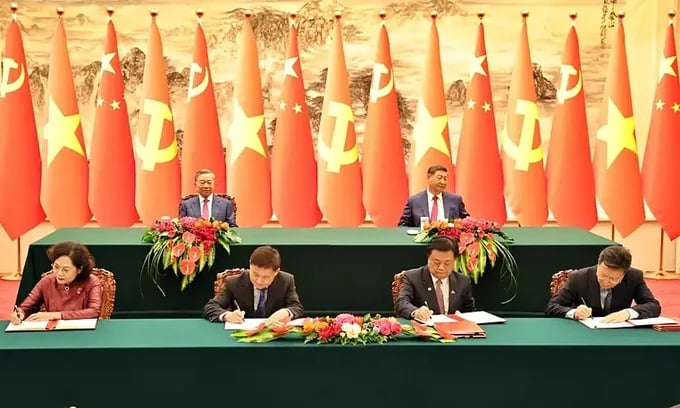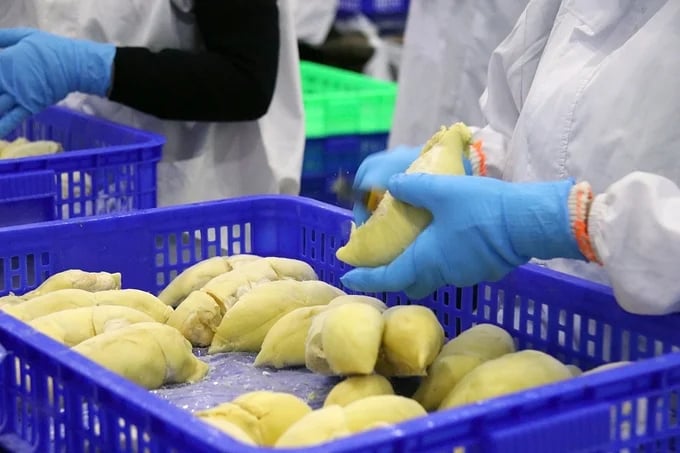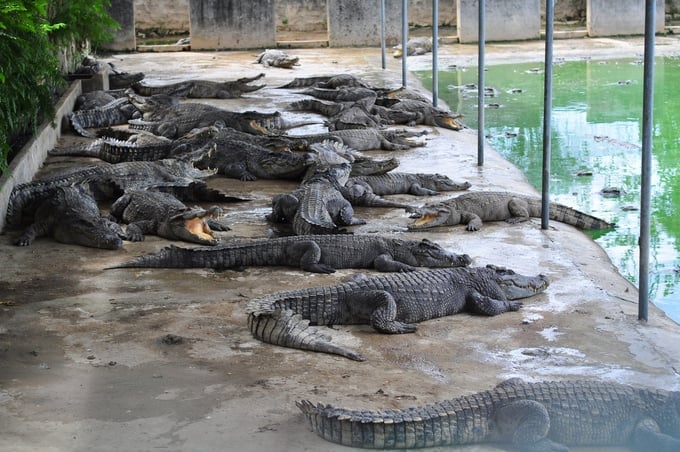November 19, 2025 | 09:43 GMT +7
November 19, 2025 | 09:43 GMT +7
Hotline: 0913.378.918
November 19, 2025 | 09:43 GMT +7
Hotline: 0913.378.918

General Secretary and President To Lam and General Secretary and President of China Xi Jinping witnessed the signing ceremony. Photo: VNA.
The signing ceremony was held during the State visit of General Secretary and President To Lam to the People's Republic of China. It opens the door for the export of fresh coconuts, frozen durians, and crocodile products to the Chinese market – a crucial advancement for Vietnam's agricultural sector.
The Protocols signed include Protocol on inspection, plant quarantine and food safety for frozen durian exported from Vietnam to China Protocol on plant quarantine requirements for fresh coconut exported from Vietnam to China, and Protocol on quarantine and health requirements for farmed crocodiles exported from Vietnam to China.
Following the signing, Minister of Agriculture and Rural Development Le Minh Hoan praised the event as the culmination of active discussions and negotiations between the specialized units of Vietnam's Ministry of Agriculture and Rural Development and China's General Department of Customs.
“We believe this will significantly boost agricultural exports, particularly the newly approved products to the Chinese market, and contribute to the growth of Vietnam's agricultural sector,” the Minister stated.
Moving forward, the Ministry of Agriculture and Rural Development is committed to closely collaborating with the General Administration of Customs of China to implement the next steps following the signing of these protocols. This collaboration ensures a smooth process for Vietnamese enterprises exporting these products to China.

Official export of frozen durian helps alleviate seasonal pressure on people. Photo: Minh Quy.
In addition to facilitating the export of these specific products, the newly signed protocols are expected to strengthen overall agricultural cooperation between Vietnam and China. The agreements are a testament to the growing economic ties and mutual trust between the two nations.
Minister Le Minh Hoan emphasized the importance of these protocols for the immediate export opportunities they present and the long-term prospects of Vietnam's agricultural sector in the global market. "By ensuring our products meet China's rigorous standards, we demonstrate our commitment to quality and safety, which will open doors to other international markets as well," he added.
The Ministry also highlighted the role of Vietnamese farmers and enterprises in maintaining the high standards required by the Chinese market. "This achievement is a collective effort. It reflects our farmers' dedication and hard work, who have embraced new technologies and practices to meet international requirements," Minister Hoan noted.
As part of the next steps, the Ministry of Agriculture and Rural Development plans to conduct workshops and training sessions to ensure that all stakeholders, from farmers to exporters, are fully informed about the new protocols and the necessary compliance measures. The Ministry will also work on enhancing the infrastructure and logistics needed to support the seamless export of these products, including developing cold chain systems for frozen durian and secure transport methods for live crocodiles.
Collaboration with China’s General Administration of Customs will continue to be a priority, with both sides committed to regular communication and problem-solving to address any challenges that may arise while implementing the protocols. The ultimate goal is to ensure that Vietnam's agricultural products are not only accepted but also valued in the Chinese market, thereby contributing to the sustained growth of Vietnam's agricultural sector.
With the Chinese market's opening, fresh coconut export turnover is projected to increase by $200-300 million in 2024, with strong growth expected in the following years. This expansion will bring significant economic benefits and catalyze the sustainable development of Vietnam's coconut industry, encouraging improvements in product quality and adherence to international standards.

Many crocodile farms across Vietnam are enthusiastic about the newly signed protocol.
The inclusion of crocodiles in the August 19 signing demonstrates the broadening scope of Vietnam’s agricultural, forestry, and aquatic exports to global markets.
Crocodile farming has been a growing sector in Vietnam for the past 30 years, with products such as meat, skin, and other parts generating high economic value. The opening of the Chinese market to crocodile products presents a significant economic opportunity, creating a new revenue stream for farmers and exporters. Beyond the financial benefits, this development is also expected to drive the Vietnamese crocodile farming industry towards more sustainable practices, ensuring compliance with environmental standards and animal welfare regulations.
By capitalizing on these new export opportunities, Vietnam aims to solidify its position as a key player in the global agricultural market while fostering its domestic industries' growth and sustainability.
Translated by Quynh Chi

(VAN) Deputy Prime Minister Tran Hong Ha convened a meeting with the MAE and relevant agencies to discuss the draft decree on national multidimensional poverty standards for the 2026 - 2030 period.

(VAN) The year 2025 marks the 10th anniversary since more than 190 countries adopted the Paris Agreement on climate change, paving the way for strengthened global action.

(VAN) The PepsiCo Foundation funded the project ‘New Harvest: Sustainable Agriculture Initiative’, focusing on regenerative agriculture and climate change.

(VAN) Dr. Nguyen Viet Hung, ILRI's Regional Director for Asia, emphasized the One Health approach in ensuring food safety and reducing antimicrobial resistance risks in livestock.

(VAN) The youth-driven initiative ‘Innovate for water, act for the future’ seeks practical, scalable solutions to Vietnam’s water challenges.

(VAN) At the Annual Science Conference of Thuyloi University, Deputy Minister Phung Duc Tien directed researchers to focus on in-depth studies, data harmonization, and solutions linked to real-world practice.

(VAN) After nearly four years of implementation, 5,187 community agricultural extension groups have been established nationwide, with 47,493 members participating.